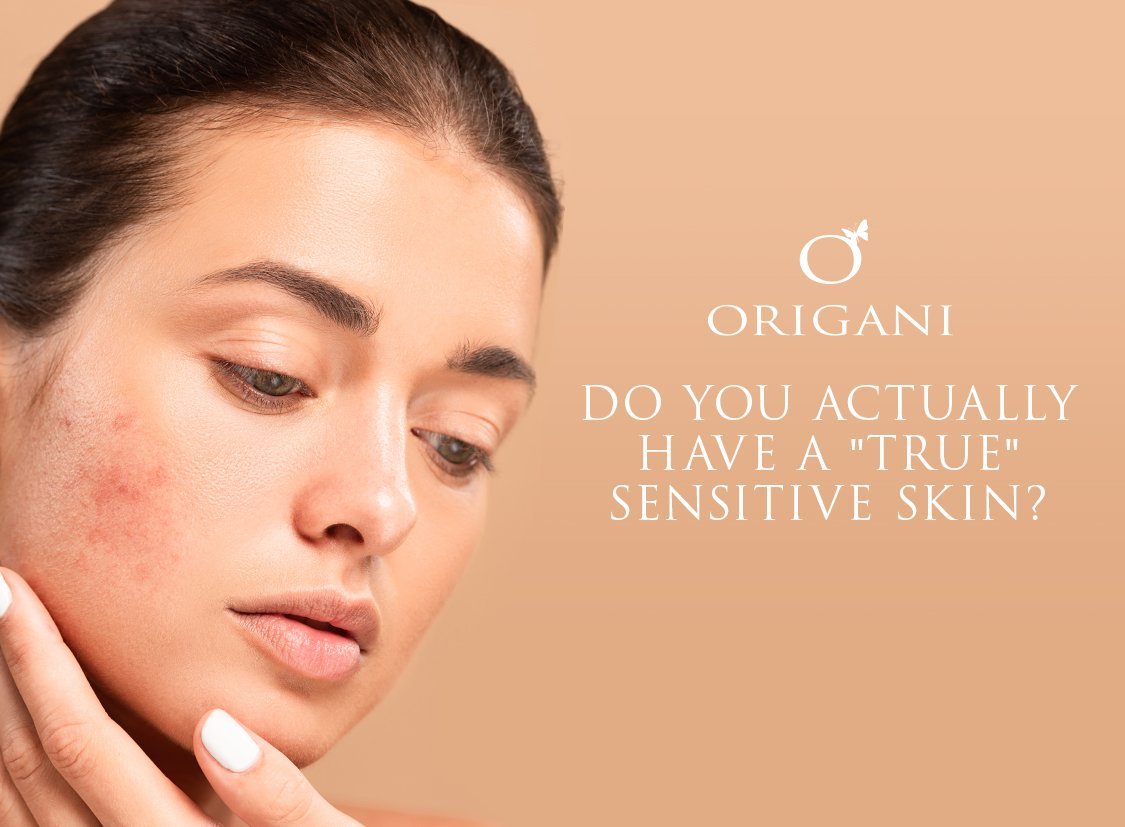The beauty industry throws around the term “sensitive skin” so frequently: the term is plastered across products and marketing campaigns in mags, the beauty floor at our local department store and all across social media. It works, triggering our own curiosity and opening up a Pandora’s Box of questions: “What is sensitive skin? Do I have it? What does it look and feel like? How do I treat it?”
For those who have sensitive skin, they will attest that it can be a real drag! It can affect your confidence and lifestyle and cause a host of unpleasant symptoms: that dreaded moment of feeling embarrassed and feeling your face burn to that one glass of red wine turning your skin beetroot red, to the frustration of not being able to find the right beauty products.
Let’s not mention stepping out in the colder months of winter: it is the harshest season on our skin due to cold dry air and indoor heating, so the skin can get quite uncomfortable.

Let’s uncover the facts on what a “true” sensitive skin really is, bust some common held beliefs, examine its causes and triggers, highlight its symptoms and outline the best ways to get sensitive skin under control.
WHAT IS SENSITIVE SKIN?
The term ‘’sensitive skin’ is not really a dermatological term as such more than it is a ‘descriptive’ word to label skin that is ‘irritated’. The term is classified as “an unpleasant sensory response to stimuli that wouldn’t ordinarily produce such symptoms.”
Signs of irritation include tightness, dryness, itching and redness with extreme cases causing pain and burning. One skin reaction or flare up does not indicate that you have sensitive skin. You are classified as having sensitive skin when those flare ups and reactions happen often.
TAKE THE SENSITIVE SKIN TEST
Do you experience some of these symptoms? If so, keep reading!
1. Often feels tight and uncomfortable (especially after cleansing)2. Is occasionally sensitive to touch
3. Feels tight and uncomfortable mid afternoon
4. Needs extra hydration in winter
5. Dehydrates when on a flight
6. Can be oily in the warmer months
7. Flushes easily after drinking alcohol or eating spicy foods, or becoming agitated
8. Has patches of warm redness on the cheeks
9. Has uneven texture with some flakiness
10. Turns red and tightens after a hot shower
NOW, LET’S BREAK SOME SENSITIVE SKIN MYTHS…
Myth #1: Many people have sensitive skin
Truth: True sensitive skin is not as common as we are led to believe. In fact, while 90% of people self-declare their skin as somewhat sensitive, the number is much, much less. This tells us that, more likely, some of us are more ‘sensitive about our skin’ or even using the wrong products for our skin type which makes our skin feel irritated.
Myth #2: Sensitive skin is a skin type
Truth: Sensitive skin is not a skin type. Any skin type can experience sensitivity, from oily and acne-prone, to dry and mature complexions.
Myth #3: Sensitive skin is allergic skin
Truth: No it is not. Anyone can have an allergic reaction to any one particular allergen. If you have a skin allergy, contact with that particular allergen will cause a reaction such as a prickling, stinging or a burning sensation. Allergic skin reactions tend to be more severe than sensitivity.
WHAT GENERALLY CAUSES SENSITIVE SKIN?
There are generally two different causes of sensitive skin.
1. Genetics: generally, a true sensitive skin is predisposed. The chances are, if your Mum or Dad have sensitive skin, then so will you.2. Lifestyle/environment: this is what we call ‘sensitised’ skin. When the skin is compromised from external forces like the environment or even what we put into/onto our bodies, the skin will react sensitively to tell you that it doesn’t like it. The skin is a fragile organ that needs to be looked after with TLC.
THE 3 TYPES OF SENSITIVE SKIN
Both genetics and lifestyle/external factors can bring out either of these manifestations of sensitive skin. Let’s separate them into 3 simple categories. The expression of sensitivity will of course define how you treat it.
1. Red/blotchy skin: heightened neural and vascular reactionsSensitive skin that often flushes red due to vascular causes. That red warm flush in your cheeks when you eat hot foods, face extreme weather or get emotional, is mostly genetically rooted, often the result of a naturally fairer and drier complexion.
2. Dry/irritated: impaired barrier function
Sensitive skin caused by a weak/compromised skin barrier that doesn’t protect or hold in moisture. Flakiness and a feeling of tightness usually results. Dry and more mature skin is more likely to fit into the category of sensitive skin. Acneic skin conditions can experience sensitivity from irritation as to do men’s skin from frequent shaving and hair removal.
3. Total skin intolerance
Rarely seen, this form of sensitive skin causes almost all products that you put on your face to burn. Medical studies still cannot fully determine why this happens and what causes it.
HOW DO YOU BEST TREAT A SENSITIVE SKIN?
You are in luck! Origani products are free from known potential skin irritants, organic and natural in nature and biocompatible with the skin.
RED/BLOTCHY SKIN
Avoid: overstimulating products that may agitate swollen blood vessels.
Use: Stick with more natural formulas with fewer active ingredients. Use products that contain anti-inflammatory ingredients that soothe and calm the complexion.
Origani recommends: Dermassure Clear & Calm Matte Comfort Moisturiser, Dermassure Clear & Calm Toning Cleanser and Erda Soothing & Reviving Night Cream
DRY/IRRITATED
Avoid: Stay away from skincare ingredients known to irritate and dry out the skin, including sodium laureth sulphate and parabens. Additionally, do not use harsh granulated exfoliators.
Use: a ceramide and lipid based moisturiser, exfoliate with a mild non-abrasive exfoliator, and wash your skin in warm water only with a non-stripping cleanser.
Origani recommends: Erda Daily Glow Toning Cleanser, Ageless by Nature Green Caviar Supernatural Butter and Manuka Honey Peel.
TOTAL SKIN INTOLERANCE:
Avoid all beauty products until medical consultation is undertaken.
STAY AWAY FROM THESE CLASSIC SENSITIVE SKIN TRIGGERS…
To help you get your skin back in the calm zone, you need to know more about possible sensitivity triggers. Here are ten of the most common ones to avoid when possible:
1. Extreme Weather (particularly the cold season)2. Alcohol
3. Spicy food
4. Hormones
5. Emotional responses
6. Hot water
7. High-foaming cleansers
8. Skincare products that do not suit your skin type
9. Stress
10. Sun exposure
Even if you don’t have a true sensitive skin type, it’s always really important to stay away from triggers listed above to maintain healthy balanced skin and skin that does not succumb to premature ageing.
Remember, your skin will show you if it’s happy! xx
Origani is an Australian luxury organic skincare brand. We proudly formulate and produce cruelty-free, certified organic, vegan skincare and makeup. Sustainable Luxury Without Compromise.










